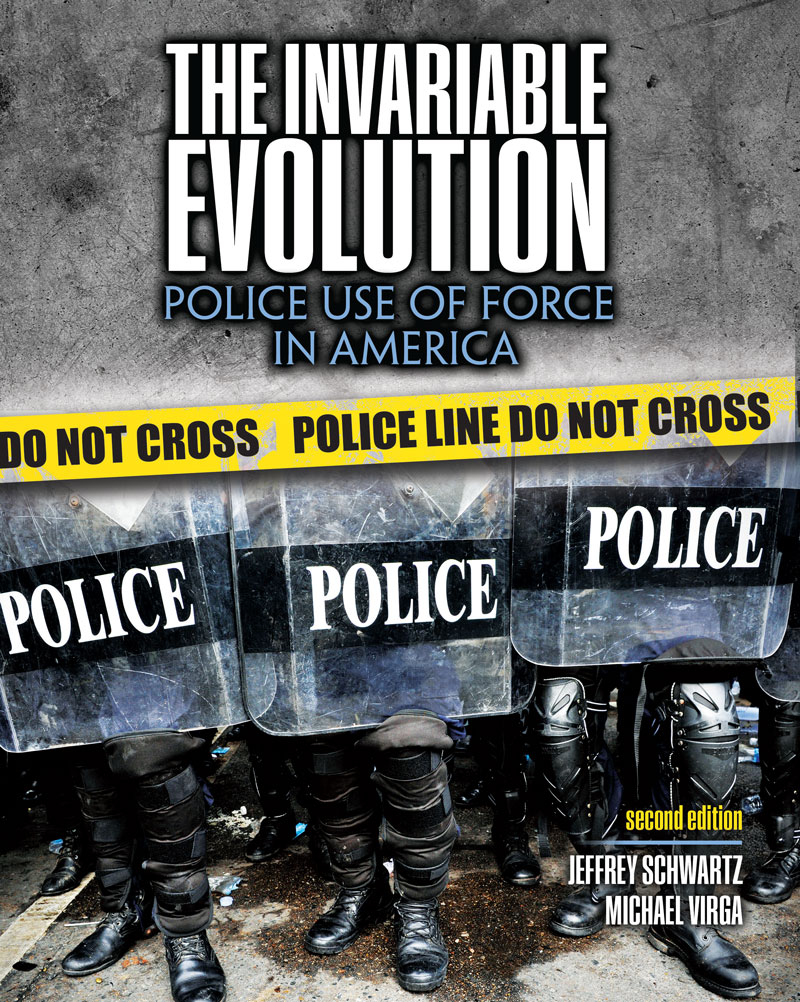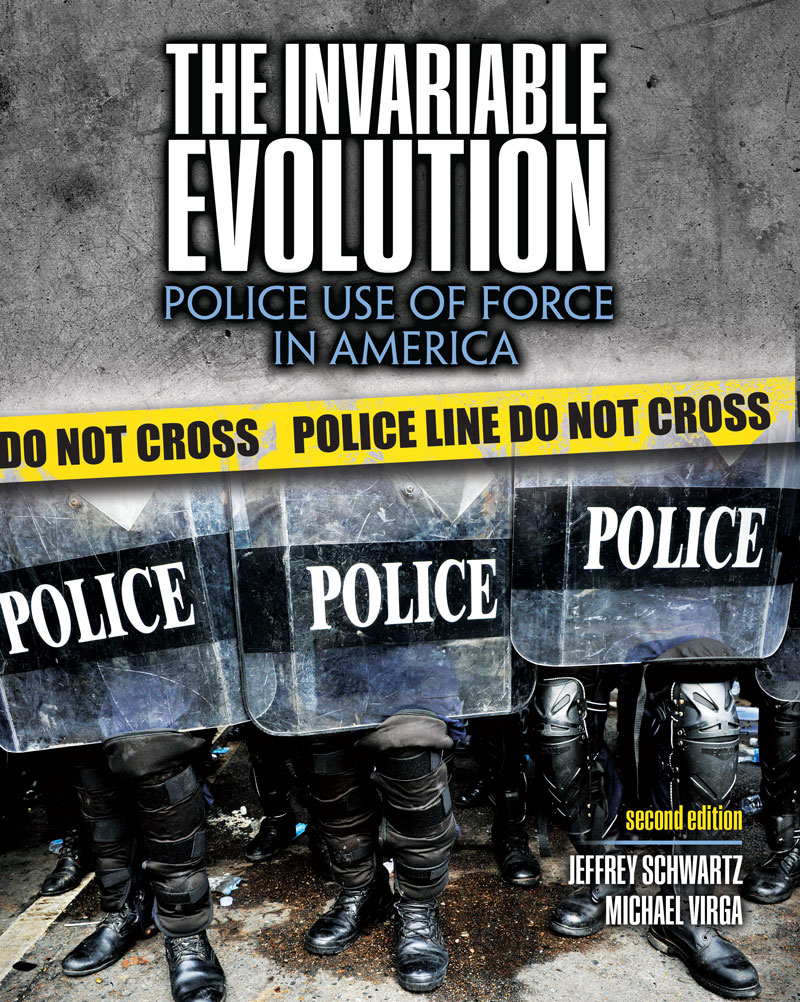The Invariable Evolution: Police Use of Force in America
Author(s): Jeffrey Len Schwartz , Michael Virga
Edition: 2
Copyright: 2019
Edition: 2
Copyright: 2019
Pages: 346
A challenging and controversial topic, police use of force, covered in a way to explain the “why” in a straightforward and unbiased manner.
This book explores the aspects of police use of force in the United States. The text provides a framework to understand the controversies surrounding the evolution of what is considered the lawful implementation of using force, poses a significant problem for law enforcement and other personnel. Law enforcement must ensure they are performing their legal duties within the boundaries of case law; at the same time, uphold public trust and protecting themselves/citizens. The text will examine the legal constraints and the practical application of police use of force. Highlighting the pathway to the professionalism and accountability required in the judicious use of force.
Published as an eBook, with a supplemental study guide, The Invariable Evolution: Police Use of Force in America focuses on providing the reader with sample reports, scenarios, and video links to enhance the understanding of this important topic.
Preface
About the Authors
Chapter 1: Policing History and Use of Force
Introduction
The 4th Amendment Reads
The History of Policing and the Use of Force in America
Sir Robert Peel’s Principles of Law Enforcement 1829
Progressivism
The Lexow Commission
The Wickersham Commission
Riots and Civil Unrest
Kerner Commission
Conclusion
Chapter 2: Foundations of Federal and State Law
Probable Cause and Reasonable Suspicion
Probable Cause
Probable Cause
Probable Cause for Arrest
Key Concepts
Investigatory detention
Exceptions to a warrant
Detailing Warrantless Searches and Seizures
Plain View
Plain Touch
Search Incident to Arrest
Consent Searches
Exigent Circumstances
Emergency Aid Doctrine
Motor Vehicle Exception
The idea of Miranda warnings
Use of Force Criteria
Key terms
Immunity
New Jersey State Law Discussion Points
Summary
Chapter 3: Legal Precedents and Case Law
Chapter 4: Civil Liability
The Start of Federal Civil Liability
Some Applicable Case Law
False Arrest
False Imprisonment
An Area of Debate
4th Amendment—Reasonableness
14th Amendment—Shocks the Conscience and case law for immunity/summary judgement
Supervisory Liability
Medical Care
More on Qualified Immunity
Conclusion
Chapter 5: Use of Force in Corrections
Force Against Prisoners
Individual Liability
Other Factors to Consider in the Use of Force in Corrections
Institutional Factors
Inmate Population Factors
Administrative Factors
Noninstitutional Causes
Chapter 6: Use-of-Force Reporting
The New Jersey OPRA and Exemptions
How Does OPRA Affect the Police and Local Government?
The Use-of-Force-Report
Incident Information
Crimes in Progress
Domestic
Other Disputes
Suspicious Person
Traffic Stop
Other
Officer Information
Subject Information
Subject Actions
Officer Use-of-Force Toward the Subject
Arrests
Conclusion
Use of Force
Chapter 7: Consent Decrees
The NJSP: Documented Cars Stops/Racial Profiling
Excerpt from NJSP Consent Decree
OPD: Investigating Complaints, Early Warning Systems and Span of Control
Early Warning Systems and Investigating Citizen Complaints
Reporting
Supervision
Span of Control
The New Orleans Police Department and Use of Force
APD: Body Cameras, Behavioral Health Training and Early Intervention Systems
Chapter 8: Concluding Statistics
2015 Year Fatality Data
Firearms-Related Fatalities
Summary
Perspective on the Killing of Unarmed Persons
In Summary
Jeffrey L. Schwartz is a Lecturing Professor of Rowan University Law and Justice Studies Department. Professor Schwartz, besides possessing advanced educational degrees, including a Phd., has numerous certifications and ongoing practical experience in the law enforcement field. He is a retired police officer, served as an officer in the U.S. Marine Corps, a former Department of Defense contractor, an approved trainer with the Federal Protective Service, the General Services Administration, the Department of Defense, the National Rifle Association (both as a civilian training counselor and as a law enforcement division instructor), the Federal Law Enforcement Training Center, and has been certified by the New Jersey Police Training Commission as an instructor since 1989. A certified lethal weapons instructor (including baton, handcuffing, defensive tactics, and firearms) for Pennsylvania State Police and an instructor for the Delaware State Police (baton, handcuffing, pepper spray, firearms). Professor Schwartz is a recognized firearms instructor for the New Jersey State Police (NJSP).
Professor Schwartz is a subject matter expert in the area of terrorism, use of force, supervision, and tactical training. Professor Schwartz is an instructor trainer in pepper spray, handcuffing, baton, defensive tactics, and firearms. He is a certified SORA instructor, Delaware security instructor, and a Pennsylvania 235 instructor. He has instructed at various police academies, security training academies, volunteers on committees for diversity in law enforcement, sought out as a consultant in diversity and inclusion, consulted with public and private schools, as well as, consulted with numerous private businesses. Professor Schwartz founded and continues to be the academic advisor to the Criminal Justice Preparation Club at Rowan University. Professor Schwartz assists numerous students interested in the field of law enforcement. Professor Schwartz is co-advisor in the Law and Justice Department’s internship program. He was awarded the “Excellence in Teaching” award in 2017 and the 2020 Excellence in Service Award out of the entire College of Humanities and Social Sciences at Rowan University, nominated by students and approved by the faculty. He has published articles, contributed to text books, presented at conferences, authored “The Criminal Justice Internship Manual” and “The Victimology Handbook”. Professor Schwartz creates curriculum to bring innovative courses to the students at Rowan. Professor Schwartz continues in research, consulting, mentoring, hosting programs to bring diversity and professionalism in law enforcement, broadening internships and creating more possibilities for students to engage in all aspects of criminal justice.
Michael Virga is an active police officer with the Township of Hamilton Police Department, in Mays Landing, NJ. He has worked as a patrolman, police detective, and now works as a front-line supervisor in the role of a patrol sergeant. He is also a professor at Rowan University in the Law and Justice Studies Department in Glassboro, NJ. He received his PhD in Criminal Justice from Nova Southeastern University, in Fort Lauderdale, FL. His dissertation focused on the perceptions of stress by law enforcement officers. He is interested in research affecting policing and other current criminal justice issues. He is extensively trained in criminal investigations, such as interview and interrogation, child forensic interviews, fingerprint classification and comparison, among others. He served as a detective for significant portion of his police career, leading and participating in many criminal investigations throughout southern New Jersey. In addition to lecturing at Rowan University, he is a member of the instructional staff for the New Jersey State Association of Chiefs of Police Command and Leadership Academy, where students in police command and supervisory positions learn to hone their skills to affectively lead and manage police personnel using select leadership theories and best practices. He is co-author of The Invariable Evolution: Police Use of Force in America (2017) and author of The Victimology Handbook (2017).
In 2017, Sergeant Michael Virga was a recipient of the The Life Saving Award - awarded to sworn and civilian members of the Hamilton Township Police Department for an exemplary act performed in the line of duty which, either through disregard of personal safety or prompt and alert action, results in the saving of a life.
In 2017, Sergeant Michael Virga was a recipient of the The Meritorious Service Bar - awarded to a sworn officer for a highly unusual accomplishment under adverse conditions with some degree of hazard to life and limb to the nominee, or where death or injury to a third party is prevented.
A challenging and controversial topic, police use of force, covered in a way to explain the “why” in a straightforward and unbiased manner.
This book explores the aspects of police use of force in the United States. The text provides a framework to understand the controversies surrounding the evolution of what is considered the lawful implementation of using force, poses a significant problem for law enforcement and other personnel. Law enforcement must ensure they are performing their legal duties within the boundaries of case law; at the same time, uphold public trust and protecting themselves/citizens. The text will examine the legal constraints and the practical application of police use of force. Highlighting the pathway to the professionalism and accountability required in the judicious use of force.
Published as an eBook, with a supplemental study guide, The Invariable Evolution: Police Use of Force in America focuses on providing the reader with sample reports, scenarios, and video links to enhance the understanding of this important topic.
Preface
About the Authors
Chapter 1: Policing History and Use of Force
Introduction
The 4th Amendment Reads
The History of Policing and the Use of Force in America
Sir Robert Peel’s Principles of Law Enforcement 1829
Progressivism
The Lexow Commission
The Wickersham Commission
Riots and Civil Unrest
Kerner Commission
Conclusion
Chapter 2: Foundations of Federal and State Law
Probable Cause and Reasonable Suspicion
Probable Cause
Probable Cause
Probable Cause for Arrest
Key Concepts
Investigatory detention
Exceptions to a warrant
Detailing Warrantless Searches and Seizures
Plain View
Plain Touch
Search Incident to Arrest
Consent Searches
Exigent Circumstances
Emergency Aid Doctrine
Motor Vehicle Exception
The idea of Miranda warnings
Use of Force Criteria
Key terms
Immunity
New Jersey State Law Discussion Points
Summary
Chapter 3: Legal Precedents and Case Law
Chapter 4: Civil Liability
The Start of Federal Civil Liability
Some Applicable Case Law
False Arrest
False Imprisonment
An Area of Debate
4th Amendment—Reasonableness
14th Amendment—Shocks the Conscience and case law for immunity/summary judgement
Supervisory Liability
Medical Care
More on Qualified Immunity
Conclusion
Chapter 5: Use of Force in Corrections
Force Against Prisoners
Individual Liability
Other Factors to Consider in the Use of Force in Corrections
Institutional Factors
Inmate Population Factors
Administrative Factors
Noninstitutional Causes
Chapter 6: Use-of-Force Reporting
The New Jersey OPRA and Exemptions
How Does OPRA Affect the Police and Local Government?
The Use-of-Force-Report
Incident Information
Crimes in Progress
Domestic
Other Disputes
Suspicious Person
Traffic Stop
Other
Officer Information
Subject Information
Subject Actions
Officer Use-of-Force Toward the Subject
Arrests
Conclusion
Use of Force
Chapter 7: Consent Decrees
The NJSP: Documented Cars Stops/Racial Profiling
Excerpt from NJSP Consent Decree
OPD: Investigating Complaints, Early Warning Systems and Span of Control
Early Warning Systems and Investigating Citizen Complaints
Reporting
Supervision
Span of Control
The New Orleans Police Department and Use of Force
APD: Body Cameras, Behavioral Health Training and Early Intervention Systems
Chapter 8: Concluding Statistics
2015 Year Fatality Data
Firearms-Related Fatalities
Summary
Perspective on the Killing of Unarmed Persons
In Summary
Jeffrey L. Schwartz is a Lecturing Professor of Rowan University Law and Justice Studies Department. Professor Schwartz, besides possessing advanced educational degrees, including a Phd., has numerous certifications and ongoing practical experience in the law enforcement field. He is a retired police officer, served as an officer in the U.S. Marine Corps, a former Department of Defense contractor, an approved trainer with the Federal Protective Service, the General Services Administration, the Department of Defense, the National Rifle Association (both as a civilian training counselor and as a law enforcement division instructor), the Federal Law Enforcement Training Center, and has been certified by the New Jersey Police Training Commission as an instructor since 1989. A certified lethal weapons instructor (including baton, handcuffing, defensive tactics, and firearms) for Pennsylvania State Police and an instructor for the Delaware State Police (baton, handcuffing, pepper spray, firearms). Professor Schwartz is a recognized firearms instructor for the New Jersey State Police (NJSP).
Professor Schwartz is a subject matter expert in the area of terrorism, use of force, supervision, and tactical training. Professor Schwartz is an instructor trainer in pepper spray, handcuffing, baton, defensive tactics, and firearms. He is a certified SORA instructor, Delaware security instructor, and a Pennsylvania 235 instructor. He has instructed at various police academies, security training academies, volunteers on committees for diversity in law enforcement, sought out as a consultant in diversity and inclusion, consulted with public and private schools, as well as, consulted with numerous private businesses. Professor Schwartz founded and continues to be the academic advisor to the Criminal Justice Preparation Club at Rowan University. Professor Schwartz assists numerous students interested in the field of law enforcement. Professor Schwartz is co-advisor in the Law and Justice Department’s internship program. He was awarded the “Excellence in Teaching” award in 2017 and the 2020 Excellence in Service Award out of the entire College of Humanities and Social Sciences at Rowan University, nominated by students and approved by the faculty. He has published articles, contributed to text books, presented at conferences, authored “The Criminal Justice Internship Manual” and “The Victimology Handbook”. Professor Schwartz creates curriculum to bring innovative courses to the students at Rowan. Professor Schwartz continues in research, consulting, mentoring, hosting programs to bring diversity and professionalism in law enforcement, broadening internships and creating more possibilities for students to engage in all aspects of criminal justice.
Michael Virga is an active police officer with the Township of Hamilton Police Department, in Mays Landing, NJ. He has worked as a patrolman, police detective, and now works as a front-line supervisor in the role of a patrol sergeant. He is also a professor at Rowan University in the Law and Justice Studies Department in Glassboro, NJ. He received his PhD in Criminal Justice from Nova Southeastern University, in Fort Lauderdale, FL. His dissertation focused on the perceptions of stress by law enforcement officers. He is interested in research affecting policing and other current criminal justice issues. He is extensively trained in criminal investigations, such as interview and interrogation, child forensic interviews, fingerprint classification and comparison, among others. He served as a detective for significant portion of his police career, leading and participating in many criminal investigations throughout southern New Jersey. In addition to lecturing at Rowan University, he is a member of the instructional staff for the New Jersey State Association of Chiefs of Police Command and Leadership Academy, where students in police command and supervisory positions learn to hone their skills to affectively lead and manage police personnel using select leadership theories and best practices. He is co-author of The Invariable Evolution: Police Use of Force in America (2017) and author of The Victimology Handbook (2017).
In 2017, Sergeant Michael Virga was a recipient of the The Life Saving Award - awarded to sworn and civilian members of the Hamilton Township Police Department for an exemplary act performed in the line of duty which, either through disregard of personal safety or prompt and alert action, results in the saving of a life.
In 2017, Sergeant Michael Virga was a recipient of the The Meritorious Service Bar - awarded to a sworn officer for a highly unusual accomplishment under adverse conditions with some degree of hazard to life and limb to the nominee, or where death or injury to a third party is prevented.


